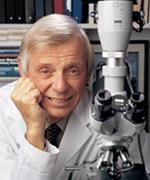 Being whipped around in a giant centrifuge may not seem like a great career move, but for James Hogg, a pathologist and emeritus professor at the University of British Columbia, it was a turning point in more ways than one. Professor Hogg was a young doctor in the mid 1960s when he spent a year with the RCAF Institute of Aviation Medicine in Toronto – a commitment to the air force for underwriting his medical degree. As part of a study looking at the effects of g-forces on airflow in the lungs, he would sometimes climb into the centrifuge with test subjects and monitor them as they were spun at high speed… Now, almost half a century later, Prof. Hogg, has been honoured with a Gairdner Award, the most prestigious biomedical prize in Canada, for his ongoing work on the causes and treatment of lung disease.
Being whipped around in a giant centrifuge may not seem like a great career move, but for James Hogg, a pathologist and emeritus professor at the University of British Columbia, it was a turning point in more ways than one. Professor Hogg was a young doctor in the mid 1960s when he spent a year with the RCAF Institute of Aviation Medicine in Toronto – a commitment to the air force for underwriting his medical degree. As part of a study looking at the effects of g-forces on airflow in the lungs, he would sometimes climb into the centrifuge with test subjects and monitor them as they were spun at high speed… Now, almost half a century later, Prof. Hogg, has been honoured with a Gairdner Award, the most prestigious biomedical prize in Canada, for his ongoing work on the causes and treatment of lung disease.
During his Ph.D. program at McGill University in the 1960s, Dr. Hogg was thoroughly trained in lung morphometry, stereology, respiratory physiology and pathophysiology. He later expanded his experimental toolkit by learning the principles of molecular biology and high resolution lungimaging giving him an unrivaled set of skills and a remarkable ability to understand the relationship between lung structure and function.
The disease was barely understood when Prof. Hogg and his mentor Peter Macklem at McGill University began to work out its underlying mechanisms in the late 1960s. Following a career track that bridges an entire revolution in molecular biology, his attention has more recently shifted to using cutting edge genetic and computational techniques to identify who is likely to get COPD and to develop ways of halting the damage.
Read the full story from The Globe and Mail
